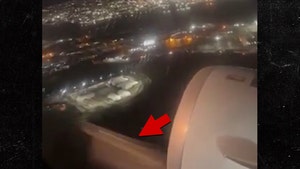A Clean Wisteria Lane
BEIJING -- Chinese broadcasters have tidied up Wisteria Lane, cutting out some of the sex and violence from "Desperate Housewives."
A Chinese-dubbed version of the ABC hit series debuted Monday on China's state-run CCTV8 channel. The entire first season was to air in seven days, with three shows playing every night.
Qin Mingxin, deputy director of the international department of CCTV's Entertainment Program Center, said the show had been somewhat sanitized during translation.
He wouldn't give details but the first episode that aired Monday night was about three minutes shorter than the original, with some lingering shots of a crime scene snipped out and a love scene played out on a dining room table altogether cut.
It was still too racy for some.
"It made me laugh, but it was also embarrassing to watch it," 49-year-old Liu Zhichao, an administrator at a power supply station in China's northern Inner Mongolia region, told The Associated Press. "There was too much sex."
In their apartment in the regional capital of Hohhot, Liu and her husband watched the first episode of the darkly comic series, which follows the exploits of five suburban American women and features arson, suicide, murder and extramarital affairs. But said they probably wouldn't stay up to watch more because they had to work the next day.
At least one direct reference to male genitalia was softened to a vague euphemism in the Mandarin version while some of the show's numerous double entendres were simply lost in translation.
And the show's title in Mandarin is not "Desperate" but "Crazy Housewives."
Carolyn So, a Hong Kong-based marketing coordinator for the show's distributor Buena Vista International Television, said Chinese broadcasters were allowed to make final edits to the show in line with their regulations.
She said that China's changes were "minor."
Regulators in China often cite foreign culture in broadcasting as a source of unwholesome influences.
In August, the Culture Ministry announced a sweeping effort to tighten the communist government's control over popular culture, including increased censorship of imported programming.
Last year, the government barred the use of foreign programs that promote "Western ideology and politics" and also banned prime-time programs about crime or violence to promote, it said, a "healthy environment" for children.
Pirated DVDs of English-language "Housewives" episodes are widely available in China's bigger cities.
Qin thinks the show "will be popular in China's cities but less so in the countryside because you need a certain understanding of the cultural background to grasp it. China and the West are very different and this show has very quick dialogue and the dialogue can be very subtle too. Not everybody is going to get it."
Beijing resident Meng Juan, 23, said she liked the show a lot and compared it to another American television export "Sex and the City," which is available on pirated DVDs in China.
"I think a lot of young Chinese people will like this show," said Meng, who helps arrange local housing for foreign exchange students. "I can't guess what's going to happen like I can with Chinese television serials. I want to keep watching this to see what's next."
Not everybody was such an instant fan.
"I really didn't like it at all," said Sun Songjie, a 24-year-old communications major at Peking University. Sun and his two roommates watched the first episode in their dorm room.
"It was really boring," Sun said. "I don't know, maybe it was the translation. Given the choice, there are a lot of other programs I'd much rather watch."




